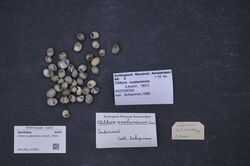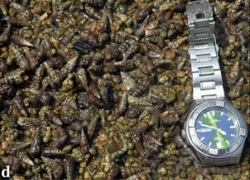Biology:Clithon oualaniense
| Clithon oualaniense | |
|---|---|
Error creating thumbnail: Unable to save thumbnail to destination
| |
| Clithon oualaniense shell | |

| |
| Clithon oualaniense shells | |
| Scientific classification | |
| Kingdom: | |
| Phylum: | |
| Class: | |
| (unranked): | |
| Superfamily: | |
| Family: | |
| Subfamily: | Neritinae
|
| Tribe: | Theodoxini
|
| Genus: | |
| Species: | C. oualaniense
|
| Binomial name | |
| Clithon oualaniense (Lesson, 1831)[2]
| |
| Synonyms[3] | |
|
Neritina oualaniensis Lesson, 1831 | |
Clithon oualaniense[3] is a species of brackish water[4] snail with an operculum, a nerite. It is an aquatic gastropod mollusk in the family Neritidae, the nerites.
Distribution
This species occurs in Indo-Pacific region: Nansei-shoto in Japan, Hong Kong, Thailand, Peninsular Malaysia, Singapore, Jawa in Indonesia, Philippines, Papua New Guinea, Queensland in Australia[1] India[5] and Ceylon.[4] It also occurs in American Samoa, Cook Islands, Fiji, French Polynesia, Guam, New Caledonia, Samoa, Solomon Islands and Vanuatu.[1]
Description
The coloration pattern on the shell is very variable.[4][6]
Ecology

Clithon oualaniense is a eurybiotic species.[7] It inhabits soft bottoms of intertidal habitats.[7] It can occur in high density, for example 347 snails per m² was recorded, that correspond to the biomass of 30.6 g per m².[7] It also inhabits sea grass bed with Zostera japonica.[8] The activity of Clithon oualaniense is diurnal; snails are active during the daytime and inactive at night.[8] It bury itself into the mud, when the tide is high, probably to avoid water predators.[9] They are on the surface feeding and mating when the tide is low.[9]
Clithon oualaniense is herbivorous, feeding of microalgae and on detritus.[8]
References
- ↑ 1.0 1.1 1.2 Köhler F. (2011). "Clithon oualaniensis". The IUCN Red List of Threatened Species 2011: e.T189178A8696900. Downloaded on 04 April 2016.
- ↑ Lesson R. (1830). Chapitre 9. Mollusques, Annélides et Vers. page 379. In: Duperrey L. I. (ed.) Voyage de la Coquille, Zoologie 2.
- ↑ 3.0 3.1 Rosenberg G. (2015). Clithon oualaniense. In: MolluscaBase (2015). Accessed through: World Register of Marine Species at http://www.marinespecies.org/aphia.php?p=taxdetails&id=737519 on 2016-04-04
- ↑ 4.0 4.1 4.2 Grüneberg H. & Nugaliyadde L. (1976). "Population studies on a polymorphic prosobranch snail (Clithon (Pictoneritina) oualaniensis Lesson). Philosophical Transactions of the Royal Society B 275(940): 385–437. doi:10.1098/rstb.1976.0088.
- ↑ Kumar P. S. & Khan A. B. (2013). "The distribution and diversity of benthic macroinvertebrate fauna in Pondicherry mangroves, India". Aquatic biosystems 9(1): 1. doi:10.1186/2046-9063-9-15.
- ↑ Gruneberg H. (1982). "Pseudo-polymorphism in Clithon oualaniensis". Proceedings of the Royal Society of London B 216(1203): 147-157. doi:10.1098/rspb.1982.0067.
- ↑ 7.0 7.1 7.2 Zvonareva S., Kantor Yu., Li X. & Britayev T. (2015). "Long-term monitoring of Gastropoda (Mollusca) fauna in planted mangroves in central Vietnam". Zoological Studies 54: 39. doi:10.1186/s40555-015-0120-0.
- ↑ 8.0 8.1 8.2 Takada Y. (2000). "Activity patterns of Clithon oualaniensis (Mollusca: Gastropoda) on intertidal seagrass beds in Hong Kong". In: The Marine Flora and Fauna of Hong Kong and Southern China V: Proceedings of the Tenth International Marine Biological Workshop: the Marine Flora and Fauna of Hong Kong and Southern China, Hong Kong, 6–26 April 1998 (Vol. 5, p. 217). Kent State University Press. 217-227.
- ↑ 9.0 9.1 Ohgaki S. I. (2001). "An example of activity pattern of the estuarine snails, Clithon faba and Clithon oualaniensis (Gastropoda: Neritidae) in the Nagura Lagoon, Ishigaki Island". Argonauta 4: 28-37. HTML.
External links
- Budiman A. (1988). "Aspect of ecology of Clithon oualaniensis (Gastropoda: Neritidae) on Sonneratia pioneer zone at Sosobok River, Kao Bay, Halmahera". In: Biological Systems of Mangroves, a Report of East Indonesian Mangrove Expedition, 1986. eds. K Ogino & M Chihara, Ehime University, 59-65.
- https://archive.org/stream/systematischesco210mart#page/192/mode/2up/
Wikidata ☰ Q24551097 entry
 |


